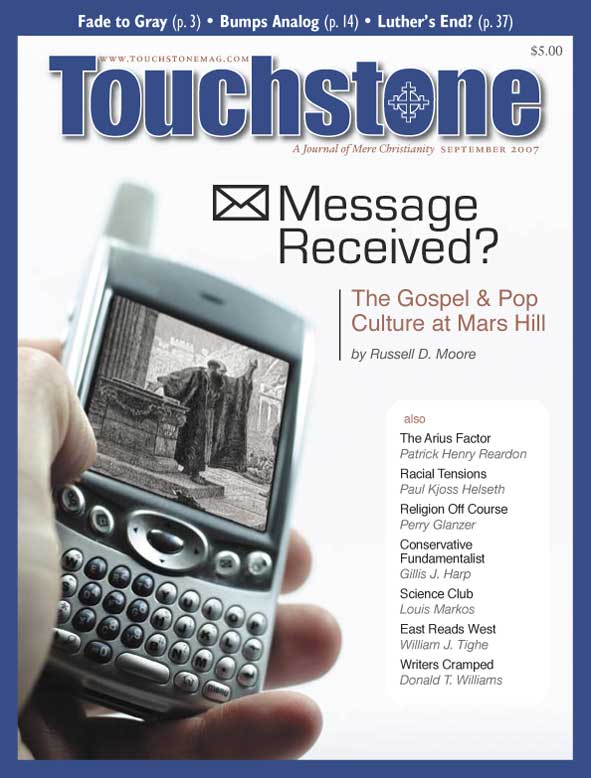Elect from Every Nation
Racial Reconciliation Won’t Happen If We Don’t Take Ephesians Seriously by Paul Kjoss Helseth
Principled opposition to the pursuit of “racial reconciliation” in the church is not in itself evidence of intercultural incompetence. It can be evidence of eagerness to safeguard the primacy and sufficiency of the gospel in the life of the church by insisting that believers have already been reconciled to God and to one another by the Cross of Christ.
I was reminded of this when reading an article in Christianity Today, adapted from a book that had appeared a couple of years before, whose authors argued that the “purpose and passion” of Jesus’ ministry centered on his “radical” desire to see the house of the Lord become “a house of prayer for all the nations.” They argued that following the death, resurrection, and ascension of Jesus, the challenge of “implementing” his vision of “multicultural worship” passed to his early followers, who then made it a reality by forming inclusive communities in which Jews and Gentiles could pursue reconciliation.
“We even go so far as to say that a Christian, by biblical definition, is a follower of Jesus Christ whose way of life is racial reconciliation,” they wrote, declaring that “the future of Christianity in the 21st century depends on practical, living examples of authentic reconciling faith.”
The One New Man
The article disturbed me, for in my estimation, by speaking of reconciliation as a “goal” that believers must strive to achieve through efforts to reduce “racial division and inequality” in the church, the authors were coming perilously close to supplanting the gospel of Jesus Christ with a version of the social gospel, one that defines reconciliation in extra--biblical terms and as a consequence breeds what Thomas Sowell calls a spirit of “self--congratulation.”
In Ephesians Paul speaks of what God accomplished on the Cross as an established reality (2:11–22). Through the Cross, God reconciled believers to himself and to one another by creating “one new man” in Christ Jesus. According to Paul, we are now at peace with God and with each other because Christ abolished “in his flesh” the “enmity” that separated us from his Father and from one another.
But what was this “enmity” that Christ abolished? Paul explains that it was the “law of commandments and ordinances” that excluded Gentiles from “the commonwealth of Israel” and “the covenants of promise,” and which itself was the basis for racial alienation in the Old Testament.
His point is simply that Christ has already reconciled believers to God and to one another by removing the objective source of their estrangement. From this it follows that those who are in the “one new man” by faith are now unified and members of the same “household of God,” and that the reluctance to acknowledge this reality calls the redemptive historical significance of the Cross into question.
It seems to me, therefore, that Ephesians 2 is relevant to Christian discussions of race neither because it suggests that racial reconciliation is a future reality that has yet to be realized in the life of the church, nor because it lends credence to the notion that Christianity’s future depends on our eagerness to pursue a social agenda of one sort or another. Paul’s teaching is relevant, rather, because it establishes that the reconciliation of believers to God and to one another is the reality that was accomplished by Christ that we are commanded to believe and maintain in keeping with the established nature of the good news we proclaim.
Since Christ has abolished the enmity and already made believers from diverse backgrounds one “in his flesh,” we ought not to challenge the sufficiency of his work by presuming that the intercultural unity of the church is a future reality that depends for its realization on our efforts to implement a particular vision of social justice, as if the objective source of racial alienation in the church still needed to be removed. Rather, we must believe what God says about the established unity of believers in the “one new man” by being diligent to preserve what has already been realized in him.
Paul Kjoss Helseth is Associate Professor of Christian Thought at Northwestern College in St. Paul, Minnesota. He has contributed to a number of publications, and most recently helped edit Reclaiming the Center: Confronting Evangelical Accommodation in Postmodern Times (Crossway Books). He, his wife Marla, and their newborn daughter are members of Good Shepherd Presbyterian Church (PCA) in Minnetonka, Minnesota.
subscription options
Order
Print/Online Subscription

Get six issues (one year) of Touchstone PLUS full online access including pdf downloads for only $39.95. That's only $3.34 per month!
Order
Online Only
Subscription

Get a one-year full-access subscription to the Touchstone online archives for only $19.95. That's only $1.66 per month!
bulk subscriptions
Order Touchstone subscriptions in bulk and save $10 per sub! Each subscription includes 6 issues of Touchstone plus full online access to touchstonemag.com—including archives, videos, and pdf downloads of recent issues for only $29.95 each! Great for churches or study groups.
Transactions will be processed on a secure server.
more from the online archives
calling all readers
Please Donate
"There are magazines worth reading but few worth saving . . . Touchstone is just such a magazine."
—Alice von Hildebrand
"Here we do not concede one square millimeter of territory to falsehood, folly, contemporary sentimentality, or fashion. We speak the truth, and let God be our judge. . . . Touchstone is the one committedly Christian conservative journal."
—Anthony Esolen, Touchstone senior editor









